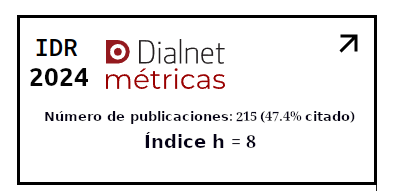Cultural adaptation and validation of an instrument that measures Orientation to Social Dominance with a gender approach in Paraguay
Keywords:
Social dominanc Gender; Validation, ParaguayAbstract
This research focused on the cultural adaptation and psychometric validation of the Social Dominance Orientation Scale with a gender approach, for the Paraguayan population. The purpose of this research was the cultural adaptation and psychometric validation of the Social Dominance Orientation Scale with a gender focus, for the Paraguayan population. The original instrument was developed in 1994 by Pratto, Sidanius, Stallwarth and Malle, with the aim of assessing the propensity to maintain hierarchical, non-egalitarian intergroup relations. The scale, in its final version, has 14 items, grouped in dimensions, one referring to male dominance, and the other related to opposition/contrast to gender equality. The sample was applied to 360 people residing in Paraguay, between 17 and 60 years of age, with an average of 26. The results allow us to conclude that the adapted version of the SDO scale with a gender approach meets the technical conditions to be used in research to be carried out in Paraguay.
Downloads
References
Bénabou, R., y Tirole, J. (2006). Incentives and Prosocial Behavior. American Economic Association, 96, 1652-1678.
Brewerm, M. (2001). Social identity, intergroup conflict, and conflict reduction. Nueva York: R. Ashmore, L. Jussim.
Castillo, M. (2011). Discriminación de género y dominancia social. Análisis de los estereotipos de género y de la influencia del priming subliminal (tesis doctoral). Universidad de Jaén, España.
Cárdenas, M., Mesa, P., Lagues, K., y Yañez, S. (2010). Adaptación y validación de la Escala de Orientación a la Dominancia Social (SDO) en una muestra chilena. Universitas Psychologica, 9, 161-168.
Eller, A., Martínez, E., Pérez, J., Rugerio, C., Villanueva, C., y Yáñez, P. (2014). #Ladies y #gentlemen del DF: Dominancia social y actitudes hacia la discriminación. Acta de investigación psicológica, 4(1), 1344-1355. Recuperado el 5 de abril de 2019 de http://www.scielo.org.mx/scielo.php?script=sci_arttext&pid=S2007- 48322014000100003&lng=es&tlng=es
Etchezahar, E., Prado-Gascó, V., Jaume, L., y Brussino, S. (2014). Validación argentina de la Escala de Orientación a la Dominancia Social. Revista Latinoamericana De Psicología, 46(1), 35-43. doi: 10.1016/S0120-0534(14)70004-4.
Ferguson, C. J., y Dyck, D. (2012). Paradigm change in aggression research: The time has come to retire the general aggression model. Aggression and Violent Behavior, 17, 220-228. doi: 10.1016/j.avb.2012.02.007
Foels, R., y Pappas, C. (2004). Learning and unlearning the myths we are taught: Gender and social dominance orientation. Springer, 50, 743-757.
Jost, J., Banaji, M., y Nosek B. (2004). A decade of system justification theory: Accumulated evidence of conscious and unconscious bolstering of the status quo. Political Psychology, 25, 881-919.
Jost, J., y Thompson, E. (2000). Group-based dominance and opposition to equality as independent predictors of self-esteem, ethnocentrism, and social policy attitudes among African Americans and European Americans. Journal of Experimental Social Psychology, 36, 209-232.
Kteily, N., Sidanius, J., y Levin, S. (2011). Social dominance orientation cause or ‘mere effect’?: Evidence for SDO as a causal predictor of prejudice and discrimination against ethnic and racial outgroups. Elsevier, 47, 208-214.
Montero, I., y León, O. G. (2002). Métodos de investigación en psicología y educación. Madrid: McGraw-Hill.
ONU Mujeres. (2016). El progreso de las mujeres en el mundo 2015-2016. Transformar las economías para realizar los derechos resumen. Estudios Feministas, 24(2), 589-614.
ONU Mujeres. (2018). Hacer las promesas realidad: la igualdad de género en la agenda 2030 para el desarrollo sostenible. ONU Mujeres.
Sidanius, J., Liu, J. H., Shaw, J. S., y Pratto, F. (1994). Social dominance orientation, hierarchy attenuators and hierarchy enhancers: Social dominance theory and the criminal justice system. Journal of Applied Social Psychology, 24(4), 338-366.
Sidanius, J., y Pratto, F. (1993). The psychology of group conflict and the dynamics of oppression. A social dominance perspective: Explorations in Political Psychology. Duke University Press.
Sidanius, J., y Pratto, F. (1996). Racism, conservatism, affirmative action and intellectual sophistication: A matter of principled conservatism or group dominance?. Journal of Personality and Social Psychology, 70, 476-490.
Sidanius, J., Levin, S., y Pratto, F. (1996). Consensual social dominance orientation and its correlates within the hierarchical structure of American society. International Journal of Intercultural Relations, 20, 385-408.
Sidanius, J., y Pratto, F. (1999). Social dominance: An intergroup theory of social hierarchy and oppression. Estados Unidos: Universidad Cambridge.
Sidanius, J., Pratto, F., Van Laar, C., y Levin, S. (2004). Social dominance theory: Its agenda and method. Political Psychology, 25, 845-880.
Sidanius, J., y Pratto, F. (2004). Social dominance theory: A new synthesis. American Psychological Association, 315-332.
Silván-Ferrero, M. P., y Bustillos, A. (2007). Adaptación de la escala de orientación a la dominancia social al castellano: Validación de la dominancia grupal y la oposición a la igualdad como factores subyacentes. Revista Psicología Social, 22, 3-15.
Zubieta, E., Delfino, G., y Fernández, O. (2008). Dominancia social, valores y posicionamiento ideológico en jóvenes universitarios. Psicodebate: Instituto de investigaciones Universidad de Buenos Aires, 8.









